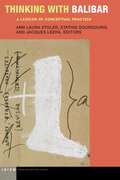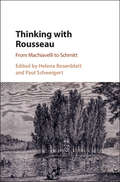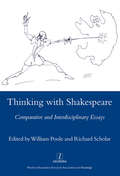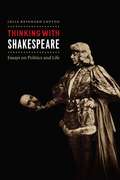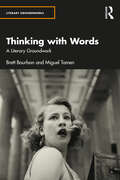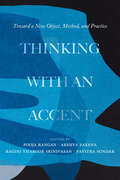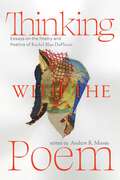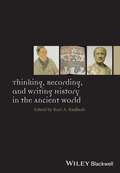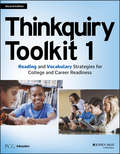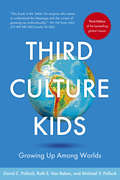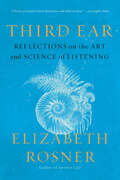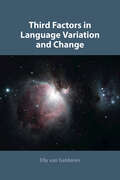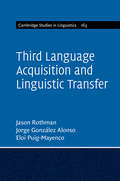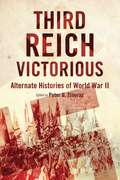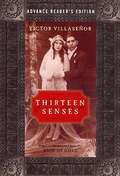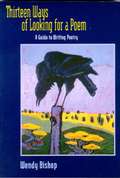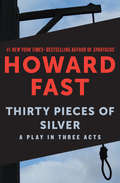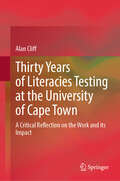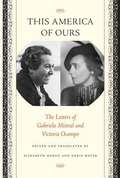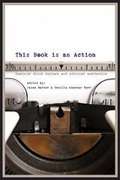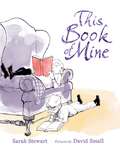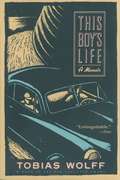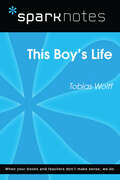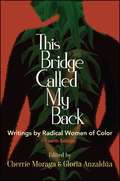- Table View
- List View
Thinking with Balibar: A Lexicon of Conceptual Practice (Idiom: Inventing Writing Theory)
by Ann Laura Stoler, Stathis Gourgouris and Jacques LezraThis volume, the first sustained critical work on the French political philosopher Étienne Balibar, collects essays by sixteen prominent philosophers, psychoanalysts, anthropologists, sociologists, and literary critics who each identify, define, and explore a central concept in Balibar’s thought. The result is a hybrid lexicon-engagement that makes clear the depth and importance of Balibar’s contribution to the most urgent topics in contemporary thought. The book shows the continuing vitality of materialist thought across the humanities and social sciences and will be fundamental for understanding the philosophical bases of the contemporary left critique of globalization, neoliberalism, and the articulation of race, racism, and economic exploitation.Contributors: Emily Apter, Étienne Balbar, J. M. Bernstein, Judith Butler, Monique David-Ménard, Hanan Elsayed, Didier Fassin, Stathis Gourgouris, Bernard E. Harcourt, Jacques Lezra, Patrice Maniglier, Warren Montag, Adi Ophir, Bruce Robbins, Ann Laura Stoler, Gary Wilder
Thinking with Kant’s Critique of Judgment
by Michel ChaouliMichel Chaouli invites novice and expert alike to set out on the path of thinking, with help from Kant’s Critique of Judgment, about the force of aesthetic experience, the essence of art, and the relationship of beauty and meaning. Each chapter unfolds the significance of a key concept for Kant’s thought and our own ideas.
Thinking with Rousseau: From Machiavelli to Schmitt
by Helena Rosenblatt Paul SchweigertAlthough indisputably one of the most important thinkers in the Western intellectual tradition, Rousseau's actual place within that tradition, and the legacy of his thought, remains hotly disputed. Thinking with Rousseau reconsiders his contribution to this tradition through a series of essays exploring the relationship between Rousseau and other 'great thinkers'. Ranging from 'Rousseau and Machiavelli' to 'Rousseau and Schmitt', this volume focuses on the kind of intricate work that intellectuals do when they read each other and grapple with one another's ideas. This approach is very helpful in explaining how old ideas are transformed and/or transmitted and new ones are generated. Rousseau himself was a master at appropriating the ideas of others, while simultaneously subverting them, and as the essays in this volume vividly demonstrate, the resulting ambivalences and paradoxes in his thought were creatively mined by others.
Thinking with Shakespeare: Comparative and Interdisciplinary Essays
by William Poole (New College, Oxford)"Shakespeares works do not embody any doctrine or set of beliefs, as his critics have long been tempted to suggest, but they do stage encounters with certain kinds of thinking ethical, political, epistemological, even metaphysical that still concern us nowadays. They can be shown to draw on ancient philosophies Platonism, Stoicism, Scepticism either directly or through medieval and continental Renaissance thought. Or their scenarios can be likened to those of other kinds of intellectual argument, such as legal or theological discourse. The essays collected in this volume demonstrate the value of thinking with Shakespeare, either as embodied in Shakespeares own creative programme or in our use of philosophical paradigms as an approach to his works. The contributors are Colin Burrow, Terence Cave, Gabriel Josipovoci, Charles Martindale, Stephen Medcalf, Subha Mukherji, A. D. Nuttall and N. K. Sugimura."
Thinking with Shakespeare: Essays on Politics and Life
by Julia Reinhard LuptonWhat is a person? What company do people keep with animals, plants, and things? Such questions—bearing fundamentally on the shared meaning of politics and life—animate Shakespearean drama, yet their urgency has often been obscured. Julia Reinhard Lupton gently dislodges Shakespeare’s plays from their historical confines to pursue their universal implications. From Petruchio’s animals and Kate’s laundry to Hamlet’s friends and Caliban’s childhood, Lupton restages thinking in Shakespeare as an embodied act of consent, cure, and care. Thinking with Shakespeare encourages readers to ponder matters of shared concern with the playwright by their side. Taking her cue from Hannah Arendt, Lupton reads Shakespeare for fresh insights into everything from housekeeping and animal husbandry to biopower and political theology.
Thinking with Words: A Literary Groundwork (Literary Groundworks)
by Miguel Tamen Brett BourbonThinking with Words: A Literary Groundwork provides a unique foundational introduction to the depths and glories of literature and its study. It is a book about why literature matters, and why it always will. Readers will explore the roots of literature and art in the interplay between life and language, actions and events, and culture and texts. This is not a book about theories; it is a book about our complex engagement with language and literature, from which theories, interpretations, and insight arise. As this is a groundwork, confusions are dissolved and analytical tools for thinking are developed and honed. Readers will discover that their ways of talking about literature can powerfully contribute to their ways of talking about life. The book resituates literary studies within fundamental arguments about language, knowledge, and ethics.Thinking with Words is essential reading for anyone interested not just in literature, but in art, culture, and language.
Thinking with an Accent: Toward a New Object, Method, and Practice (California Studies in Music, Sound, and Media #3)
by Pooja Rangan, Akshya Saxena, Ragini Tharoor Srinivasan, and Pavitra SundarA free ebook version of this title is available through Luminos, University of California Press’s Open Access publishing program. Visit www.luminosoa.org to learn more. Everyone speaks with an accent, but what is an accent? Thinking with an Accent introduces accent as a powerfully coded yet underexplored mode of perception that includes looking, listening, acting, reading, and thinking. This volume convenes scholars of media, literature, education, law, language, and sound to theorize accent as an object of inquiry, an interdisciplinary method, and an embodied practice. Accent does more than just denote identity: from algorithmic bias and corporate pedagogy to migratory poetics and the politics of comparison, accent mediates global economies of discrimination and desire. Accents happen between bodies and media. They negotiate power and invite attunement. These essays invite the reader to think with an accent—to practice a dialogical and multimodal inquiry that can yield transformative modalities of knowledge, action, and care.
Thinking with the Poem: Essays on the Poetry and Poetics of Rachel Blau DuPlessis (Recencies Series: Research and Recovery in Twentieth-Century American Poetics)
by Andrew R. MossinBroad-ranging and pluralistically investigative, the essays in Thinking with the Poem document Rachel Blau DuPlessis&’s authorial interventions as a poet, scholar, and cultural critic steeped in the linguistic and political frames of her time. The writers included in this volume engage root-level questions at the heart of DuPlessis&’s praxis as posed by her in a recent essay: &“What is a poem, what is a poet, what is an oeuvre, what is the &‘poetic&’?&” Inventive and noncanonical, these essays offer substantive responses to these and other questions, providing new routes of inquiry into the poetry and poetics of this preeminent figure of new writing.
Thinking, Recording, and Writing History in the Ancient World (Ancient World: Comparative Histories #8)
by Kurt A. RaaflaubThinking, Recording, and Writing History in the Ancient World presents a cross-cultural comparison of the ways in which ancient civilizations thought about the past and recorded their own histories. Written by an international group of scholars working in many disciplines Truly cross-cultural, covering historical thinking and writing in ancient or early cultures across in East, South, and West Asia, the Mediterranean, and the Americas Includes historiography shaped by religious perspectives, including Judaism, early Christianity, Islam, and Buddhism
Thinkquiry Toolkit 1: Reading and Vocabulary Strategies for College and Career Readiness
by PCG EducationEssential, easy-to-implement tools for teachers to help improve literacy across the content areas, as mandated by the CCSS Thinkquiry Toolkit 1, Second Edition, is a collection of teacher instructional practices, student learning strategies, and collaborative routines that improves reading comprehension and vocabulary learning in grades 4 through 12. Each practice, strategy, or routine is research-based, high impact, multi-purpose and effective in improving student learning across multiple content areas. It addresses the importance of the ability to read, write, speak, listen, and think well enough to learn whatever one wants to learn, to demonstrate that learning, and to transfer that learning to new situations. Thinkquiry Toolkit 1 iscomprised of five sections: Overview of the Common Core State Standards for English Language Arts & Literacy and the related instructional shifts Selecting the Right Tools for Maximum Learning Laying the Foundation Before Reading/Learning Building New Knowledge During Reading/Learning, and Expanding and Deepening Understanding After Reading/Learning If teachers collaboratively use these practices, strategies, and routines; teach them to students; and use them regularly across content areas, students will develop confidence and competence as readers, writers, and learners. A division of Public Consulting Group (PCG), PCG Education provides instructional and management services and technologies to schools, school districts, and state education agencies across the U.S. and internationally. They apply more than 30 years of management consulting expertise and extensive real-world experience as teachers and leaders to strengthen clients' instructional practice and organizational leadership, enabling student success.
Third Culture Kids: Growing Up Among Worlds
by David C. Pollock Ruth E. VanrekenA Nicholas Brealey Publishing bestseller! Third culture kids (TCK)—children of expatriates, missionaries, military personnel, and others who live outside their passport country—have unique issues with personal development and identity. David C. Pollock and Ruth E. Van Reken bring to light the emotional and psychological realities that come with the TCK journey.
Third Ear: Reflections on the Art and Science of Listening
by Elizabeth RosnerThis illuminating book weaves personal stories of a multilingual upbringing with the latest scientific breakthroughs in interspecies communication to show how the skill of deep listening enhances our curiosity and empathy toward the world around usThird Ear braids together personal narrative with scholarly inquiry to examine the power of listening to build interpersonal empathy and social transformation. A daughter of Holocaust survivors, Rosner shares stories from growing up in a home where six languages were spoken to interrogate how psychotherapy, neurolinguistics, and creativity can illuminate the complex ways we are impacted by the sounds and silences of others.Drawing on expertise from journalists, podcasters, performers, translators, acoustic biologists, spiritual leaders, composers, and educators, this hybrid text moves fluidly along a spectrum from molecular to global to reveal how third-ear listening can be a collective means for increased understanding and connection to the natural world.
Third Factors in Language Variation and Change
by Elly Van GelderenIn this pioneering study, a world-renowned generative syntactician explores the impact of phenomena known as 'third factors' on syntactic change. Generative syntax has in recent times incorporated third factors – factors not specific to the language faculty – into its framework, including minimal search, labelling, determinacy and economy. Van Gelderen's study applies these principles to language change, arguing that change is a cyclical process, and that third factor principles must combine with linguistic information to fully account for the cyclical development of 'optimal' language structures. Third Factor Principles also account for language variation around that-trace phenomena, CP-deletion, and the presence of expletives and Verb-second. By linking insights from recent theoretical advances in generative syntax to phenomena from language variation and change, this book provides a unique perspective, making it essential reading for academic researchers and students in syntactic theory and historical linguistics.
Third Language Acquisition and Linguistic Transfer (Cambridge Studies in Linguistics #163)
by Jason Rothman Jorge González Alonso Eloi Puig-MayencoIs acquiring a third language the same as acquiring a second? Are all instances of non-native language acquisition simply one and the same? In this first book-length study of the topic, the authors systematically walk the reader through the evidence to answer these questions. They suggest that acquiring an additional language in bilinguals (of all types) is unique, and reveals things about the links between language and mind, brain, and cognition, which are otherwise impossible to appreciate. The patterns of linguistic transfer and what motivates it when there are choices (as can only be seen starting in third language acquisition) underscores a key concept in linguistic and psychological sciences: economy. Overviewing the subfields examining multilingual acquisition and processing, this book offers an expanded systematic review of the field of multilingual morphosyntactic transfer, as well as providing recommendations for the future emerging field.
Third Reich Victorious: Alternate Histories of World War II
by Peter G. Tsouras<P> This book is a stimulating and entirely plausible insight into how Hitler and his generals might have defeated the Allies, and a convincing sideways look at the Third Reich's bid at world domination in World War II. <P> What would have happened if, for example, the Germans captured the whole of the BEF at Dunkirk? Or if the RAF had been defeated in the Battle of Britain? What if the U-Boats had strangled Britain with an impregnable blockade, if Rommel had been triumphant in North Africa or the Germans had beaten the Red Army at Kursk? The authors, writing as if these and other world-changing events had really happened, project realistic scenarios based on the true capabilities and circumstances of the opposing forces. Third Reich Victorious is a dynamic and eye-opening alternate history that opens up the dramatic possibilities of World War II.
Thirteen Senses: a Memoir
by Victor Edmundo VillaseñorThirteen Senses continues the exhilarating family saga that began in the widely acclaimed bestseller "Rain of Gold. Thirteen Senses begins with the fiftieth wedding anniversary of the aging former bootlegger Salvador and his elegant wife, Lupe. When asked by a young priest to repeat the sacred ceremonial phrase "to honor and obey," Lupe surprises herself and says. "No, I will not say 'obey.' How dare you! You don't talk to me like this after fifty years of marriage and I now knowing what I know!" After the hilarious shock of Lupe's rejection of the ceremony, the Villasenor family is forced to examine the love that Lupe and Salvador have shared for so many years -- a universal, gut-honest love that will eventually energize and inspire the couple into old age. In "Thirteen Senses, Victor Villasenor brings readers into the Bonnie-and-Clyde-like world of his colorful, immigrant family: a world set in Depression-era Southern California: a harsh world, where only the wily and strong survive, and where love, passion, and commitment to "familia are the sole dependable forces in Lupe's and Salvador's lives. In the unfolding of their story, we see Lupe move beyond her young and naive conventions of femininity to become a vessel of power, strength, courage, and brains.
Thirteen Ways of Looking for a Poem: A Guide to Writing Poetry
by Wendy BishopThirteen Ways of Looking for a Poem is grounded in the belief that the best way to learn to write poetry - and improve one's writing in general - is through practice. The book's unique approach - teaching the elements of poetry through various poetic forms - encourages students to learn from existing models and to break free from pre-established constraints. In thirteen chapters centered on the sonnet, the haiku, and other traditional and not-so-traditional forms, the author demonstrates through numerous innovative exercises the many ways in which beginning poets can enrich their writing by studying and practicing poetic form.
Thirty Pieces of Silver: A Play in Three Acts
by Howard FastA couple in Washington, DC, is torn apart when a friend is accused of treasonJane and David Graham live upper-middle-class lives in mid-century Washington, DC. Jane minds the home with the help of a fulltime maid, and David works at the Treasury Department. But when the FBI visits their house one evening to ask questions about a friend&’s political beliefs, the answers the two give separately cause them both to wonder whether they truly know each other. Soon nothing is certain as the ideological fears plaguing the nation threaten to destroy Jane and David&’s family. Howard Fast&’s first play, Thirty Pieces of Silver was performed in several countries, from Australia to Europe, and offers an insightful look at the destructive power of reactionary politics in America. This ebook features an illustrated biography of Howard Fast including rare photos from the author&’s estate.
Thirty Years of Literacies Testing at the University of Cape Town: A Critical Reflection on the Work and its Impact
by Alan CliffThis book delves into extensive research regarding the identification and characterization of academic literacies constructs, encompassing academic literacy, quantitative literacy, mathematics comprehension, and reasoning skills, with a specific focus on their relevance within South African educational contexts. The volume provides an in-depth exploration of the research behind the design and creation of assessments aimed at gauging these crucial literacies. It also delves into theoretical aspects of developmental work while shedding light on historical and contemporary inequalities in the South African educational landscape. Emphasising the practical implications of this research, the book underscores the pivotal role that assessing academic literacies can play in the equitable selection of students, particularly those hailing from educationally disadvantaged backgrounds. Additionally, it highlights how such assessments can inform higher education responsiveness, curriculum development, programme implementation, and the provision of support services for students, ultimately aiding in informed student placement decisions.
This America of Ours: The Letters of Gabriela Mistral and Victoria Ocampo
by Doris Meyer Elizabeth HoranGabriela Mistral and Victoria Ocampo were the two most influential and respected women writers of twentieth-century Latin America. Mistral, a plain, self-educated Chilean woman of the mountains who was a poet, journalist, and educator, became Latin America's first Nobel Laureate in 1945.<P> Ocampo, a stunning Argentine woman of wealth, wrote hundreds of essays and founded the first-rate literary journal Sur. Though of very different backgrounds, their deep commitment to what they felt was "their" America forged a unique intellectual and emotional bond between them. <P> This collection of the previously unpublished correspondence between Mistral and Ocampo reveals the private side of two very public women. In these letters (as well as in essays that are included in an appendix), we see what Mistral and Ocampo thought about each other and about the intellectual and political atmosphere of their time (including the Spanish Civil War, World War II, and the dictatorships of Latin America) and particularly how they negotiated the complex issues of identity, nationality, and gender within their wide-ranging cultural connections to both the Americas and Europe.
This Book Is an Action: Feminist Print Culture and Activist Aesthetics
by Cecilia Konchar Farr Jaime HarkerThe Women's Liberation Movement held a foundational belief in the written word's power to incite social change. In this new collection, Jaime Harker and Cecilia Konchar Farr curate essays that reveal how second-wave feminists embraced this potential with a vengeance. The authors in This Book Is an Action investigate the dynamic print culture that emerged as the feminist movement reawakened in the late 1960s. The works created by women shined a light on taboo topics and offered inspiring accounts of personal transformation. Yet, as the essayists reveal, the texts represented something far greater: a distinct and influential American literary renaissance. On the one hand, feminists took control of the process by building a network of publishers and distributors owned and operated by women. On the other, women writers threw off convention to venture into radical and experimental forms, poetry, and genre storytelling, and in so doing created works that raised the consciousness of a generation. Examining feminist print culture from its structures and systems to defining texts by Margaret Atwood and Alice Walker, This Book Is an Action suggests untapped possibilities for the critical and aesthetic analysis of the diverse range of literary production during feminism's second wave.
This Book of Mine: A Picture Book
by Sarah StewartA dazzling depiction of the connection between diverse readers of all ages and their books, from beloved author-illustrator team Sarah Stewart and David Small. This Book of Mine is a celebration of the power of reading, of the ways in which books launch our adventures, give us comfort, challenge our imaginations, and offer us connection. From new mothers to fantasy lovers, butterfly hunters to musicians, the readers of This Book of Mine all share a common passion for favorite books—whether freshly discovered at the library or bookstore or saved from childhood and reread across a lifetime. A unique gift for bibliophiles young and old, This Book of Mine trumpets a simple truth: A well-loved book in hand brings color to any reader’s life.
This Boy's Life
by Tobias WolffAutobiography of Wolff as a boy in the 1950s, by turns tough and vulnerable, crafty and bumbling. Separated by divorce from his father and brother, Toby and his mother are constantly on the move. As he fights for identity and self-respect against the unrelenting hostility of a new stepfather, his experiences are at once poignant and comical, and Wolff masterfully recreates the frustrations, cruelties, and joys of adolescence.
This Boy's Life (SparkNotes Literature Guide Series)
by SparkNotesThis Boy's Life (SparkNotes Literature Guide) by Tobias Wolff Making the reading experience fun! Created by Harvard students for students everywhere, SparkNotes is a new breed of study guide: smarter, better, faster.Geared to what today's students need to know, SparkNotes provides:*Chapter-by-chapter analysis *Explanations of key themes, motifs, and symbols *A review quiz and essay topicsLively and accessible, these guides are perfect for late-night studying and writing papers
This Bridge Called My Back: Writings by Radical Women of Color (Fourth Edition)
by Gloria Anzaldúa Cherríe Moraga<p>Originally released in 1981, This Bridge Called My Back is a testimony to women of color feminism as it emerged in the last quarter of the twentieth century. Through personal essays, criticism, interviews, testimonials, poetry, and visual art, the collection explores, as coeditor Cherríe Moraga writes, “the complex confluence of identities—race, class, gender, and sexuality—systemic to women of color oppression and liberation.” <p>Reissued here, nearly thirty-five years after its inception, the fourth edition contains an extensive new introduction by Moraga, along with a previously unpublished statement by Gloria Anzaldúa. The new edition also includes visual artists whose work was produced during the same period as Bridge, including Betye Saar, Ana Mendieta, and Yolanda López, as well as current contributor biographies. Bridge continues to reflect an evolving definition of feminism, one that can effectively adapt to, and help inform an understanding of the changing economic and social conditions of women of color in the United States and throughout the world.</p>
